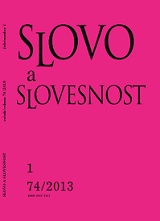Pragmatika situace
Pragmatics of situation
Author(s): Petr KaderkaSubject(s): Language and Literature Studies
Published by: AV ČR - Akademie věd České republiky - Ústav pro jazyk český
Keywords: human action; situation; communicative situation; scientific situation; intersubjectivity; semiotic multimodality; social interaction; communicative patterns; communicative genres
Summary/Abstract: This study is aimed at clarifying the notions of ‘situation’ and ‘communicative situation’, drawing upon Alfred Schütz’s theories of pragmatic and communicative aspects of the lifeworld. The concepts of ‘situation’ and ‘communicative situation’ are approached in relation to the phenomena of human action and human communication, respectively. Following Schütz, it is argued that the overall nature of ‘situation’ arises from its ‘objective’ and ‘subjective’ aspects, i.e. the spatial, temporal and socio-cultural conditions experienced by an individual and shaped by his or her unique ‘biographical situation’. This perspective is temporarily suspended in communication: private systems of relevances are superseded by intersubjective constructions or interpretations of ‘what-we-are-doing-in-and-through-communication’. The communicative situation’ is conceived of as a dynamic phenomenon and a true achievement of social actors, who permanently define and redefine, interpret and reinterpret both its overall character and its relevant elements. This theoretical framework, enriched by the concept of semiotic multimodality, is exemplified by an analysis of conversational data drawn from ethnographic research into television news production. At the end of the paper, a distinction between the typifications made by ordinary social actors and by social scientists in characterizing communicative situations is discussed.
Journal: Slovo a slovesnost
- Issue Year: 74/2013
- Issue No: 1
- Page Range: 13-40
- Page Count: 28
- Language: Czech

